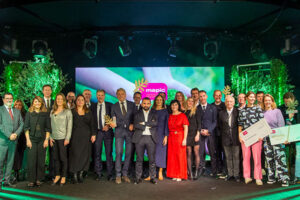“I am honored to follow in the path of many leaders in the real estate industry and serve as ULI’s global chair,” said Peter Ballon, global head of real estate for CPP Investments and the new global chair of the Urban Land Institute. “ULI is a member-driven organization and I see my role very much as a steward of the Institute. I will focus my efforts on delivering our mission and shaping our programs in the way that our members want to see them implemented.”
“Peter is a very accomplished real estate leader with extensive experience of leading global organizations,” said Ed Walter, ULI’s global CEO. “Peter’s insights and guidance will be invaluable to ULI as we continue with our global expansion and explore new ways to make an impact in communities worldwide.”
Earlier this year, ULI unveiled a new articulation of its mission statement – Shape the future of the built environment for transformative impact in communities worldwide – supported by three mission commitments of Connect, Inspire, Lead. Following extensive discussion among ULI’s members and staff, the Institute has decided on three mission priorities that the organization will focus on over the next three years. The priorities are: decarbonizing the real estate sector and targeting net zero; educating the next generation of diverse real estate leaders; and increasing housing attainability in communities around the world. All three priorities will be underpinned by a commitment and focus on diversity, equity, and inclusion (DEI), which recognizes that our communities can only be successful and sustainable if they work for everyone.
ULI will approach decarbonizing the real estate sector by implementing the “Net Zero Imperative”, funded by ULI’s immediate past global chair, Owen Thomas, and other member donors. The program will deliver five Advisory Services activities each year that will help cities determine how to accelerate decarbonization, with the aggregate best practices and learnings shared throughout ULI’s networks. ULI also plans to set an industry-wide goal, aligned with the ULI Greenprint goals of reducing carbon intensity by 50% from a 2009 baseline and achieve net zero carbon by 2050. ULI Greenprint membership currently accounts for more than 10,000 buildings worldwide with a net asset value of $1.2 trillion.
ULI will look to increase the number of housing permits and starts in target cities around the world by 2025, by providing its members with targeted and applicable best practice information. ULI will develop and fund a “Focus on Housing” program that combines Advisory Services panels and research to create a compendium of best practices that can guide cities to develop solutions to create more housing. ULI will continue to publish its Housing Attainability Report and will utilize the ULI Terwilliger Center’s Kemp and Larson Awards programs to showcase creative housing solutions.
ULI will target connecting 50,000 students and young professionals, with a focus on people from diverse backgrounds, to ULI and the real estate industry by 2024 as part of its commitment to educate the next generation of diverse leaders. ULI will deliver this by cultivating awareness and interest at a high school level through the expansion of its UrbanPlan program; expanding foundational educational offerings to university students through programs such as University Connections, the Hines Competition, and the Etkin Scholars Program; and develop early career professionals through ULI Learning courses, mentorship opportunities and ULI’s Real Estate Diversity Initiative (REDI).
“The three mission priorities will help us deliver the mission by focusing our collective efforts on tackling a few well-defined real estate challenges where we can make a significant and measurable difference,” said Ed Walter. “Our mission priorities will influence the programs we deliver, the events that we organize, the content that we produce and who we partner with and raise funds from.”
“ULI needs to focus on the greatest challenges and opportunities of the day and concentrate on where we can have the greatest impact,” comments Peter Ballon. “Based on feedback that we have received from ULI’s members, there are three challenges and opportunities that currently stand out. Perhaps the greatest challenge and where real estate has an outsized influence is climate change. ULI can be a thought leader, helping the real estate world address that challenge and turn it from a negative to a great opportunity for all stakeholders in the industry.”
“Affordable housing is becoming more and more a challenge as wealth disparity grows,” continues Peter Ballon. “Finding a better way to ensure that more people have access to affordable housing is a goal—and an opportunity—for all real estate stakeholders. Each city has its own unique challenges, but the need for a solution is global and needs to be addressed immediately.”
“Finally, a third goal which ULI members have told us is among their top priorities is education. An important part of ULI’s mandate is to ensure that we share what we know, but also to ensure that the organization is addressing a wide audience, not solely the pre-existing real estate stakeholders. We need to welcome a new diverse group of members. Diversity, equity, and inclusion are critical to ULI achieving its goals and its broader mandate,” concludes Ballon.
In addition to Peter Ballon’s appointment as ULI’s global chair, the Institute also elected five members to the Global Board of Directors, which is the global governing body that provides strategic direction for the Institute. The five members are: Benjamin Cha, chief executive, Grosvenor, Hong Kong; Jon Geanakos, executive managing director, global co-head / investor client relations, JLL Capital Markets, Boston, Massachusetts; thenew chair of the ULI Foundation, Faron Hill, president, Peregrine Oak, Atlanta, Georgia; the new chair of ULI Asia Pacific, Teng Chye Khoo, professor, National University of Singapore, Singapore; and Kavindi Wickremage, managing director, real estate, Bain Capital, Boston,Massachusetts.







